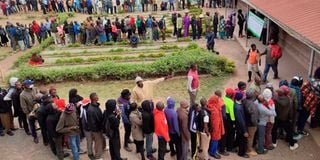Why reforms are necessary

Kenyan voters wait in line to cast their ballots on August 9, 2022. Each general election has generated calls for electoral justice. And we have come a long way – from mlolongo voting in 1988 to electronic identification of voters and transmission of results.
Some politicians on the government side have responded to calls for reform with hubris, chest-thumping and insults. The grandstanding does nothing to help resolve the underlying weaknesses of Kenya’s economy and nascent democracy.
While the nation has undeniably made progress in the last two decades, it has been hard fought. And successive rounds of reforms have yet to cure some fundamental problems. Let us briefly examine three – electoral justice, jobless growth, and the high cost of living.
Each general election has generated calls for electoral justice. And we have come a long way – from mlolongo voting in 1988 to electronic identification of voters and transmission of results. Problems persist. It appears the dead sometimes vote. Transparent ballot boxes and counting at the polling station were to reduce ballot stuffing and related mischief.
But transmission and tallying of results remain a theatre of intrigues. Having agents was to bridge the trust deficit. But if the electoral system was working properly, would there be any need for agents?
Instead, we have the absurd situation of using taxes to hire 420,000 election officials, then individual candidates employ a similar number to ascertain that the first group is not stealing!
Is it time to consider using mobile phones to vote? After all, we moved Sh9 trillion (70 per cent of the GDP) last year on mobile money.
Unemployment, jobless growth and the rise of the survivalist informal sector are not new issues, nor created by the current administration. To be fair, the current team made electoral promises to reform the fundamental structure of the economy, thereby resolving the issues.
Although not new, the intensity and magnitude of the problem have become bigger each year. Even in the years of commendable GDP growth (say above six per cent), formal sector employment hardly increases with more than 100,000 new jobs, a far cry from the one million new job seekers.
With smallholder, labour-intensive agriculture having lost its shine, the new entrants end up in the jua-kali sector. With low capital, and technology use, innovation and productivity are almost non-existent.
Kibaki action
A well-known early effort to understand the causes and recommend action was commissioned by Kibaki in 1971. Completed the following year by the ILO, the diagnostic recommended population control, rural development, the subdivision of land towards labour-intensive smallholder units, export-oriented manufacturing with less reliance on private foreign investment, and a focus on services, small-scale and rural industries.
Later efforts focused on access to finance and markets by micro, small and medium industries. Three parliaments ago, we thought part of the answer was having a coordinating institution, thus we created the Micro and Small Enterprise Authority. Still, the problem has grown.
As a net importer, a weak shilling feeds inflationary pressure. A strong current account, driven by remittances and investment flows, has supported the shilling. But when it tanks, such as in 2011, and in the last six months, prices go through the roof. Regular droughts worsen the situation.
But early import substitution efforts gave way to import preferences, most glaringly in the EPZ and SEZ schemes. Imported machinery and inputs are duty- and tax-free.
However, the same is not extended to Kenyan-made machinery, nor inputs sourced locally, making them less competitive.
These three issues are by no means the only ones requiring solutions beyond rhetoric and grandstanding. Two require a fundamental rethinking of the economic structure.
Such deep reform needs very high levels of legitimacy, which cannot be achieved through name-calling. Citizens are on the streets because the regime seems unable or unwilling to tackle these problems. Is it time to change tack?
@NdirituMuriithi is an economist




